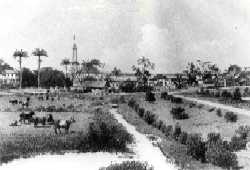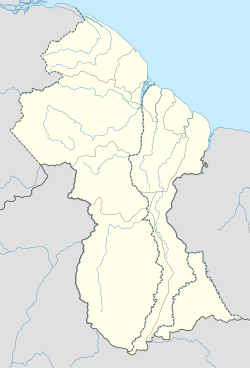
Georgetown is the capital and largest city of Guyana. It is situated in Demerara-Mahaica, region 4, on the Atlantic Ocean coast, at the mouth of the Demerara River. It is nicknamed the "Garden City of the Caribbean." It is the retail, administrative, and financial services centre of the country, and the city accounts for a large portion of Guyana's GDP. The city recorded a population of 118,363 in the 2012 census.
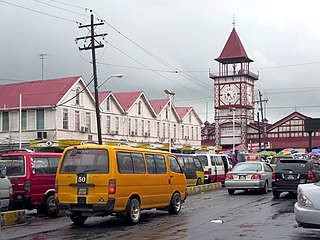
Demerara-Mahaica is a region of Guyana, bordering the Atlantic Ocean to the north, the region of Mahaica-Berbice to the east, the region of Upper Demerara-Berbice to the south and the region of Essequibo Islands-West Demerara to the west.

The Umana Yana is a conical palm thatched hut (benab) erected for the Non-Aligned Foreign Ministers Conference in Georgetown, Guyana in August 1972 as a V.I.P. lounge and recreation centre.

The Non-Aligned Foreign Ministers Conference was held in Georgetown, Guyana from 8 August to 12 August 1972.
Ian McDonald is a Caribbean-born poet and writer who describes himself as "Antiguan by ancestry, Trinidadian by birth, Guyanese by adoption, and West Indian by conviction." His ancestry on his father's side is Antiguan and Kittitian, and Trinidadian on his mother’s side. His only novel, The Humming-Bird Tree, first published in 1969, is considered a classic of Caribbean literature.
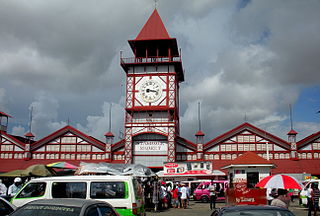
Stabroek Market is the largest market of Georgetown, Guyana. Located in the centre of the capital city, the market is housed in an iron and steel structure with a prominent clock tower.
Stabroek was the old name of Georgetown, Guyana, between 1784 and 1812, and was the capital of Demerara. Stabroek is currently a ward in the centre of Georgetown.

The Georgetown Lighthouse was first built by the Dutch in 1817 and then rebuilt in 1830 to help guide ships into the Demerara River from the Atlantic Ocean. The 31 m (103 feet) high octagonal structure is a famous Georgetown, Guyana landmark with its distinct vertical red and white stripes. The Lighthouse, located on Water Street, is maintained by the National Trust of Guyana.
The Railways of Guyana comprised two public railways, the Demerara-Berbice Railway and the Demerara-Essequibo railway. There are also several industrial railways mainly for the bauxite industry. The Demerara-Berbice Railway is the oldest in South America. None of the railways are in operation in the 21st century.

The Sea Wall is a 280-mile seawall that runs along much of Guyana's coastline, including all of the coastline in the capital city of Georgetown. It protects settlements in the coastal areas of Guyana, most of which are below sea level at high tide.
Unity is a rural village in the East Coast district of the Demerara-Mahaica region of Guyana. The village is notable for being the birthplace of both Shivnarine Chanderpaul, former captain of the West Indies cricket team and Bharrat Jagdeo, former president of Guyana. Colin Croft is also from the area.
Cove and John is located on the Atlantic coast of Guyana, 18 miles east of Georgetown and bordered by Nabacalis to the west and Victoria to the east. It has a population of 494 people as of 2012. This village has the Guyana Sevashram.
Bourda Cemetery is an eighteenth-century cemetery situated on Bourda Street in Georgetown, Guyana. Formerly known as "Bourda's Walk", Bourda cemetery is the oldest cemetery in Georgetown, and the only surviving plantation cemetery in the city. It is considered a national landmark and has been listed as a monument by the National Trust of Guyana.
National Communications Network (NCN) is a national, state-owned television and radio broadcasting corporation in Guyana. It was formed in 2004 through the merger of the government radio service, Guyana Broadcasting Corporation (GBC), and the government-run television service, GTV. NCN's studios are situated on Homestretch Avenue in Georgetown.
Werk-en-rust, also Werken-Rust, is a ward in Georgetown, Guyana, located along the Demerara River that feeds into the Atlantic Ocean.
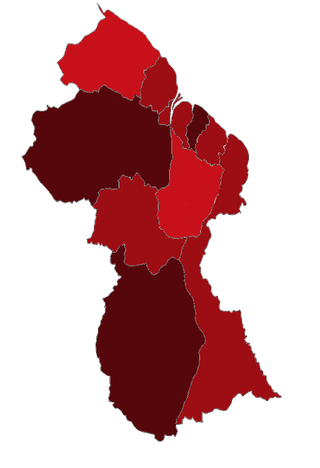
The COVID-19 pandemic in Guyana is part of the worldwide pandemic of coronavirus disease 2019 caused by severe acute respiratory syndrome coronavirus 2. The virus was confirmed to have reached Guyana on 11 March 2020. The first case was a woman who travelled from New York, a 52-year-old woman with underlying health conditions, including diabetes and hypertension. The woman died at the Georgetown Public Hospital.
Guyana National Park is an urban park in Georgetown, Guyana and was opened with Queen Elizabeth II. in attendance and was formerly named Queen Elizabeth II National Park in honour of her state visit.
The National Trust of Guyana is a 1972 Guyanese conservation organisation to protect and conserve monuments of historic and national importance. Their main function is to preserve objects of national interest as well as managing their access by the public.

Juan Anthony Edghill is a Guyanese pastor and politician. He is the founder and presiding bishop of Zadok Ministers Fellowship. Edghill is also the current Guyanese Minister of Public Works in Guyana.

Austin House located in Georgetown, is the official residence of the Anglican Bishop of Guyana. The building is named after William Piercy Austin, the first Anglican bishop of Guyana.
